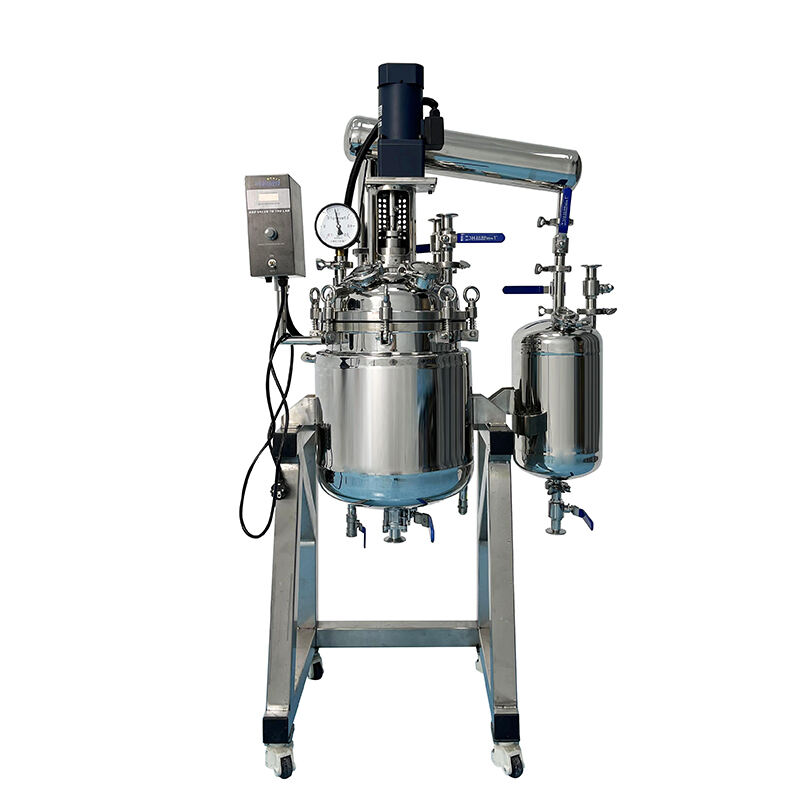The Ultimate Guide to Jacketed Reactors: Temperature Control & Industrial Applications
Introduction
Jacketed reactors are an essential component in modern chemical processing, providing precise temperature control for a wide range of industrial applications. Whether in pharmaceuticals, specialty chemicals, or materials science, these reactors enable efficient and controlled chemical reactions, improving Product quality and operational efficiency. This guide explores the fundamentals of jacketed reactors, their working mechanisms, advantages, and real-world applications.
What is a Jacketed Reactor?
A jacketed reactor consists of an inner vessel where the reaction occurs and an outer jacket that circulates heating or cooling mediums, such as water, oil, or glycol solutions. This design ensures stable reaction temperatures, minimizes thermal gradients, and enhances reaction efficiency. By maintaining optimal conditions, jacketed reactors prevent product degradation and improve reaction consistency.
Key Components of a Jacketed Reactor
Reactor Vessel – The primary chamber where chemical reactions take place.
Jacket System – Surrounds the vessel and allows controlled heating or cooling.
Temperature Control Unit (TCU) – Regulates the temperature by adjusting heat transfer fluid circulation.
Agitator System – Ensures uniform mixing of reactants, improving reaction kinetics.
Vacuum System (Optional) – Lowers boiling points for specific processes, enhancing energy efficiency.
How Temperature Regulation Works in Jacketed Reactors
Precise temperature control is crucial in chemical processing, affecting reaction rates, yield, and product quality. Modern jacketed reactors integrate advanced PID controllers and thermocouples to monitor and regulate temperature with high accuracy. These systems minimize fluctuations, ensuring reproducibility in both laboratory and industrial-scale operations.
Additionally, vacuum pump technology can enhance temperature control by lowering the boiling points of reactants, leading to faster reaction times and improved efficiency.
Industrial Applications of Jacketed Reactors
1. Pharmaceutical Synthesis
Jacketed reactors are widely used in pharmaceutical manufacturing, particularly for the synthesis of active pharmaceutical ingredients (APIs). Precise temperature control ensures product purity and consistency, crucial for regulatory compliance and drug efficacy. Reactions such as esterifications and hydrogenations greatly benefit from these controlled environments.
2. Specialty Chemical Production
Fine chemicals and agrochemicals require stringent processing conditions. Jacketed reactors provide the flexibility to handle both exothermic and endothermic reactions, supporting the production of complex molecules with high efficiency. The specialty chemicals market continues to grow, with demand for precision chemical synthesis driving technological advancements in reactor design.
3. Material Science & Nanotechnology
In materials research, including polymerization and nanoparticle synthesis, temperature stability is key. Jacketed reactors allow scientists to maintain controlled conditions necessary for high-quality material production, enhancing product performance in coatings, electronics, and biomedical applications.
Advanced Features Enhancing Reactor Performance
Rotary Agitation for Homogeneous Mixing
Rotary agitation systems play a vital role in ensuring uniform reactant distribution. These systems cater to varying viscosities, from low-viscosity solutions to high-viscosity slurries, optimizing reaction outcomes.
Liftable Designs for Easy Maintenance
Innovative liftable jacketed reactors simplify maintenance and cleaning, reducing downtime in production environments. This feature is particularly beneficial in pharmaceutical and specialty chemical industries, where equipment sanitation is critical.
Optimized Heating and Cooling Fluids
The choice of heat transfer fluid significantly impacts reactor performance. Water, mineral oils, and glycol solutions each offer distinct advantages based on their thermal properties. Ongoing research aims to improve these fluids for enhanced efficiency and adaptability to various chemical processes.
Comparative Advantages of Jacketed Reactors
1. Against Unjacketed Reactors
Superior temperature control prevents overheating and undesired byproducts.
Enhanced safety by reducing the risk of thermal runaway reactions.
Improved reaction consistency and yield.
2. Versus Falling Film Evaporators
Multifunctionality allows heating, cooling, mixing, and pressure regulation in one system.
Greater flexibility in handling various reaction types.
Reduced operational costs by consolidating multiple processes into a single unit.
Conclusion
Jacketed reactors are indispensable for industries requiring precision in chemical reactions. Their ability to maintain stable reaction conditions, support advanced temperature regulation, and enhance product quality makes them a preferred choice in pharmaceuticals, specialty chemicals, and material science. Investing in high-quality jacketed reactors ensures efficiency, safety, and compliance with stringent industry standards.
Looking for a Reliable Jacketed Reactor Solution?
At Shanghai Valuen Industrial Co., Ltd., we specialize in customizable jacketed reactors tailored to your specific industry needs. CONTACT US today to learn how our advanced reactor systems can optimize your chemical processes!


